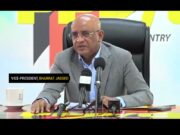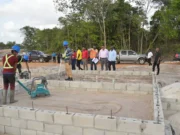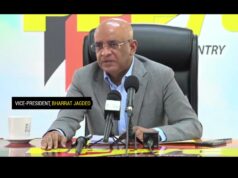HDM Labs — a US company that came under public fire for charging and subsequently defaulting on a $409.497M government contract for emergency drugs — has shut down its business operations in Guyana.
The company closed its Light Street doors and even removed a sign that was erected there.
The reason for closing the local operation is not yet clear. The company faced widespread public criticism for a number of reasons, such as defaulting on the contract by providing the drugs long after the scheduled delivery date; bidding just over $200M more than its nearest competitor; and selling the drugs for at least $100M more than it could have been sourced.
HDM Labs, which has its parent branch in the United States (US), is owned solely by US-based Guyanese Hardatt Singh.
According to its financial statements, HDM Labs, which was established in 2012, never did any business until it landed the big government deal in 2017.
In June 2017, the Ministry of Public Health sole sourced $366.9M worth of ’emergency’ drugs from HDM Labs. This was after other known suppliers, including Ansa McAL Trading Limited, were disqualified by Ministry of Health officials for various reasons.
These companies bid hundreds of millions of dollars less than the sum Singh was awarded. After Singh’s bid, the highest bid was made by Ansa McAL at $190.6M.
Furthermore, HDM Labs was not one of the companies that bid for the contract. But, on June 19, 2017, the Ministry wrote HDM Labs requesting that the company, which reportedly had no prior experience, submit quotations and availability for the supply and delivery of pharmaceuticals.
On that same day, Public Health Ministry’s Permanent Secretary, Collette Adams, wrote the Chairman of the National Procurement and Tender Administration (NPTAB) Berkley Wickham, seeking permission for the company to be allowed to sole source the required pharmaceuticals.
She told NPTAB that this became a requirement after the companies that bid for the supply failed to withstand a “restrictive tendering process” that is employed by the Ministry of Public Health.
The bidding companies are said to have failed various requirements. Interestingly, one of the needed requirements was technical capacity; that is, companies needed to have carried out similar transactions before.
It is not clear how HDM passed this requirement.
HLD R. Seebarran & Co, does financial statements on behalf of HDM Labs.
On August 2, 2016, the audit company wrote the Deeds Registry, “We have been retained by the Directors of HDM Labs (GY) Inc. to prepare and audit financial statements for the year ended December 31, 2012; 2013; 2014 and 2015.
“The company was incorporated on April 10, 2012 and had no trading activity to date. This information was provided and confirmed by the Directors of the company.”
Meanwhile, when the media carried articles about what was deemed “blatant corruption,” the Ministry of Public Health defended the deal. But, despite the vehement defence that the Ministry of Public Health mounted about its arrangement with HDM Labs, the Audit Office of Guyana still investigated the arrangement and vowed to “conduct further scrutiny of the awarding and execution of the contract.”
So far, the Audit Office has found that HDM Labs took six months to complete its supply of over $400M worth of “emergency drugs” that was needed within two weeks. Further, auditors compared the prices charged by HDM Labs to the prices charged by other suppliers.
A table presented in the 1027 audit report noted that the drugs could have been sourced for at least $100M less.
Audit Office said, “We compared the prices quoted for each item by the approved tenderer with that quoted by the initial three tenderers to determine whether there was due diligence with regard to economy in awarding the contract. It was determined in nine instances that the prices quoted by HDM Labs were significantly higher than that of the initial three suppliers.”
Audit Office said that the “contract which was awarded on August 31, 2017 by NPTAB in the sum of US$1,891,443 or Guyana dollar equivalent of $409.497M, was signed on 8 September 2017.” There were several “unsatisfactory features” noted during the examination of the documents.
Auditors noted that “the supplier was required to supply the drugs two weeks after signing of the contract; all items should have been delivered no later than 22 September 2017. At this date, no items were delivered. Delivery commenced in October 2017.
“As at 31 December 2017, items to the value of $141.892M or 35 percent of the contract price were delivered. The supplier fulfilled his obligations under the contract in March 2018, six months after the agreed delivery date.”













